Ever wondered how to make the perfect Persian Saffron Rice with Tahdig? With this easy and flavourful recipe, you’ll create a delicious side that pairs well with all kinds of main dishes. In no time, you’ll be enjoying a fragrant plate of saffron-infused rice encircled by the crispy tahdig crust!
For those who love rice dishes, this is a must-try! This traditional dish combines aromatic saffron rice with a crispy layer of rice called Tahdig. It is a staple in Iranian cuisine and is enjoyed by people all around the world. Here, we will explore the key ingredients and techniques required to create the perfect Persian Saffron Rice with Tahdig.
What a ‘Perfect Persian Rice Flip’ looks like!
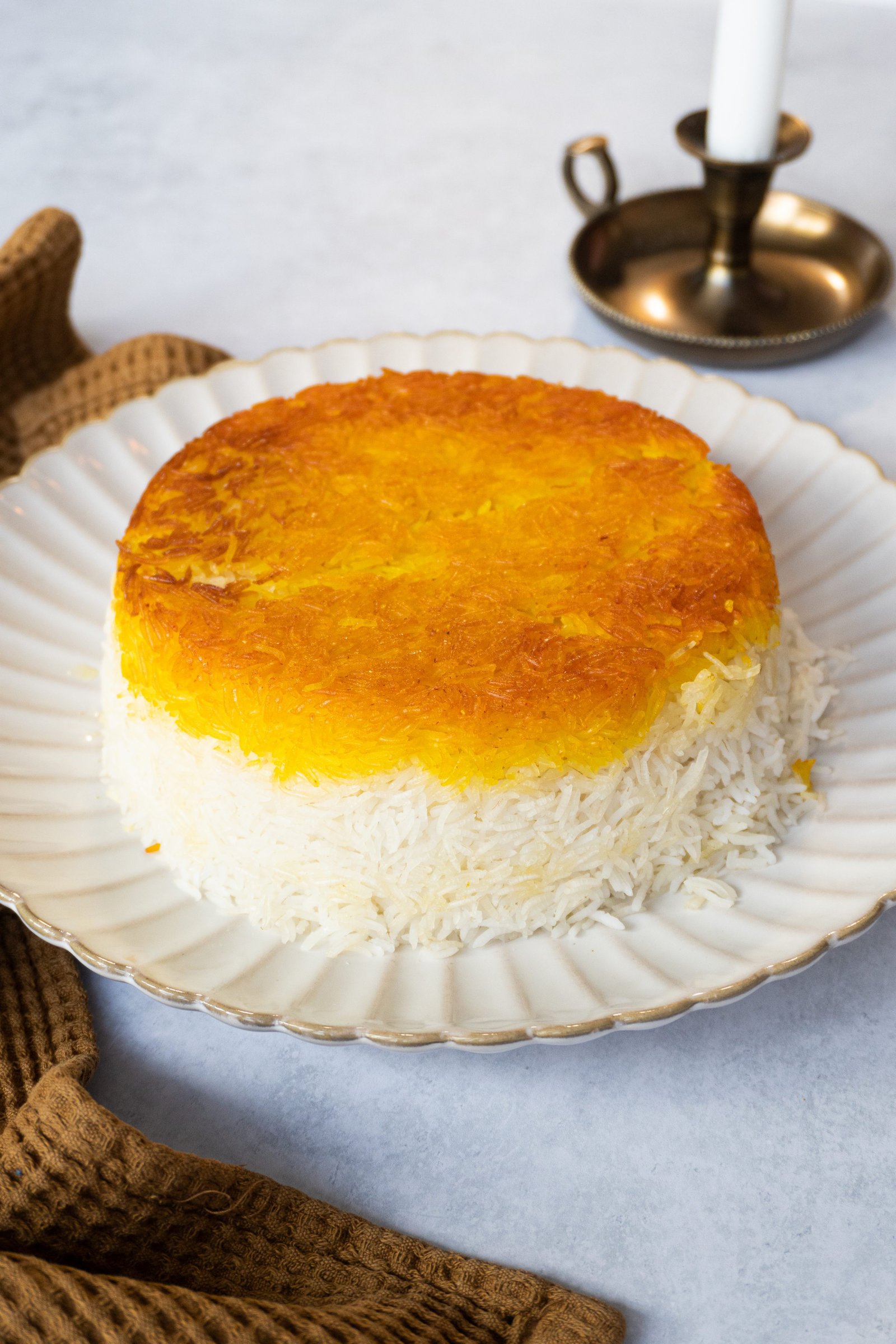
What is Tahdig Rice?
Tahdig is a staple in Persian cuisine, meaning “bottom of the pot” in Persian. It is a crispy layer of rice that is created at the bottom of the cooking pot when making Persian saffron rice. The process of making Tahdig involves spreading a layer of cooked rice in a non-stick pan and cooking it over low heat until it becomes crispy and golden brown. The end result is a delicious and crunchy layer of rice that provides a perfect contrast to the fluffy and aromatic rice above it.
Tahdig can be made using different ingredients, such as oil or butter, to achieve the right balance between crispiness and tenderness. Additionally, traditional techniques such as using a piece of naan bread or potato slices as a barrier can also be used. The key to making the perfect Tahdig is to cook it over low heat, allowing it to gradually crisp up and achieve that golden brown color.
Tahdig is a versatile dish, serving as both a side dish or main course, and is enjoyed by rice lovers worldwide. The combination of the crispy and crunchy texture of the Tahdig with the fluffy and aromatic rice makes for a delicious and satisfying meal. Overall, Tahdig is a must-try for anyone who loves rice dishes and is interested in exploring the flavors of Persian cuisine.
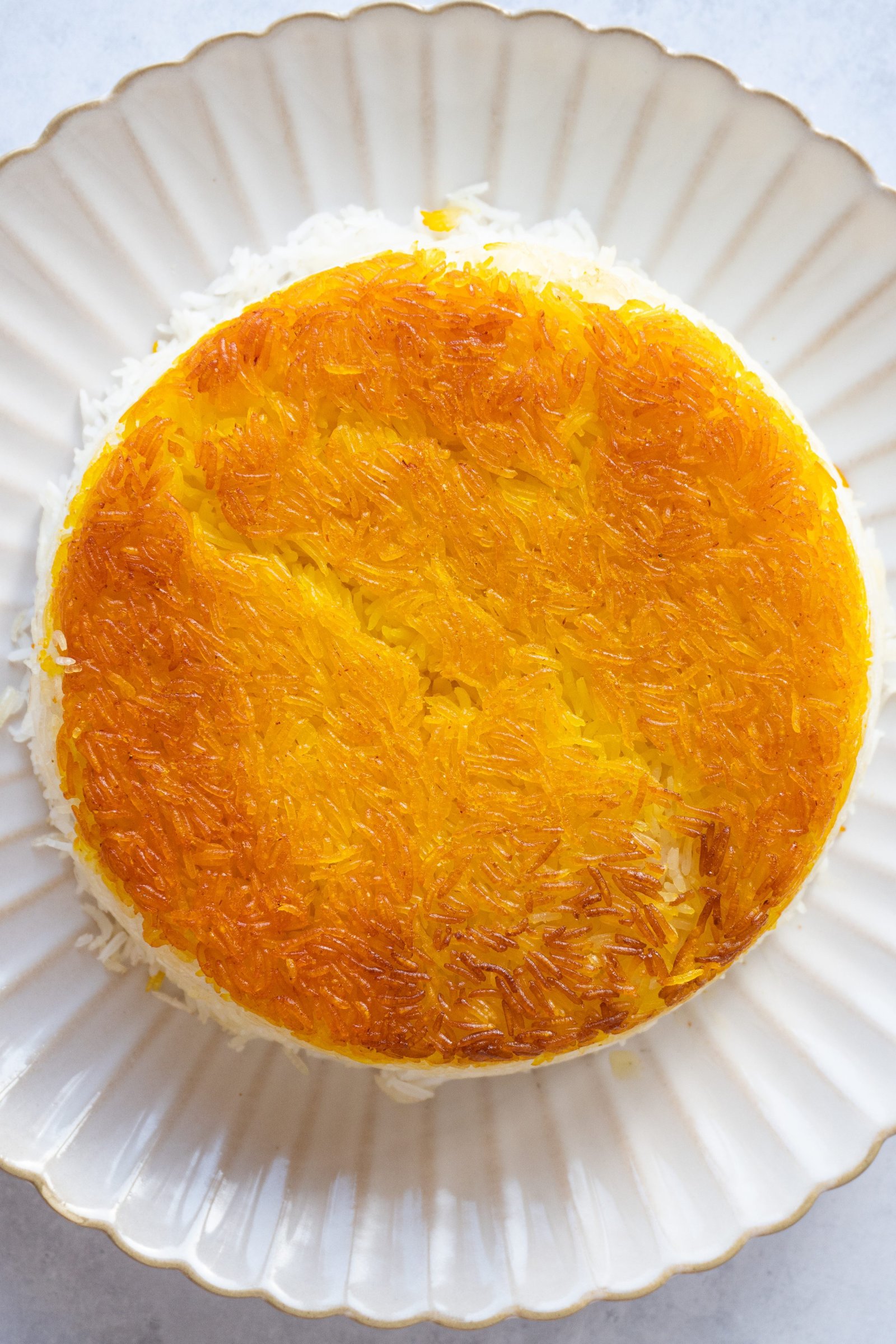
The Perfect Tahdig Rice
The secret to creating the perfect Persian Saffron Rice with Tahdig is to achieve a balance between the aromatic and fluffy rice, and the crispy and golden brown Tahdig. This dish is a perfect accompaniment to a variety of dishes, such as grilled meats or stews. It can also be enjoyed on its own as a delicious and filling meal.
In conclusion, this Tahdig Rice is a delicious and satisfying dish that combines aromatic rice with a crispy layer of rice. It is a staple in Iranian cuisine and is enjoyed by people all around the world. Whether you are a seasoned cook or just starting out, this Persian rice recipe is sure to impress. So why not give it a try and treat your taste buds to a crispy delight?
Deliciously warm and satisfying
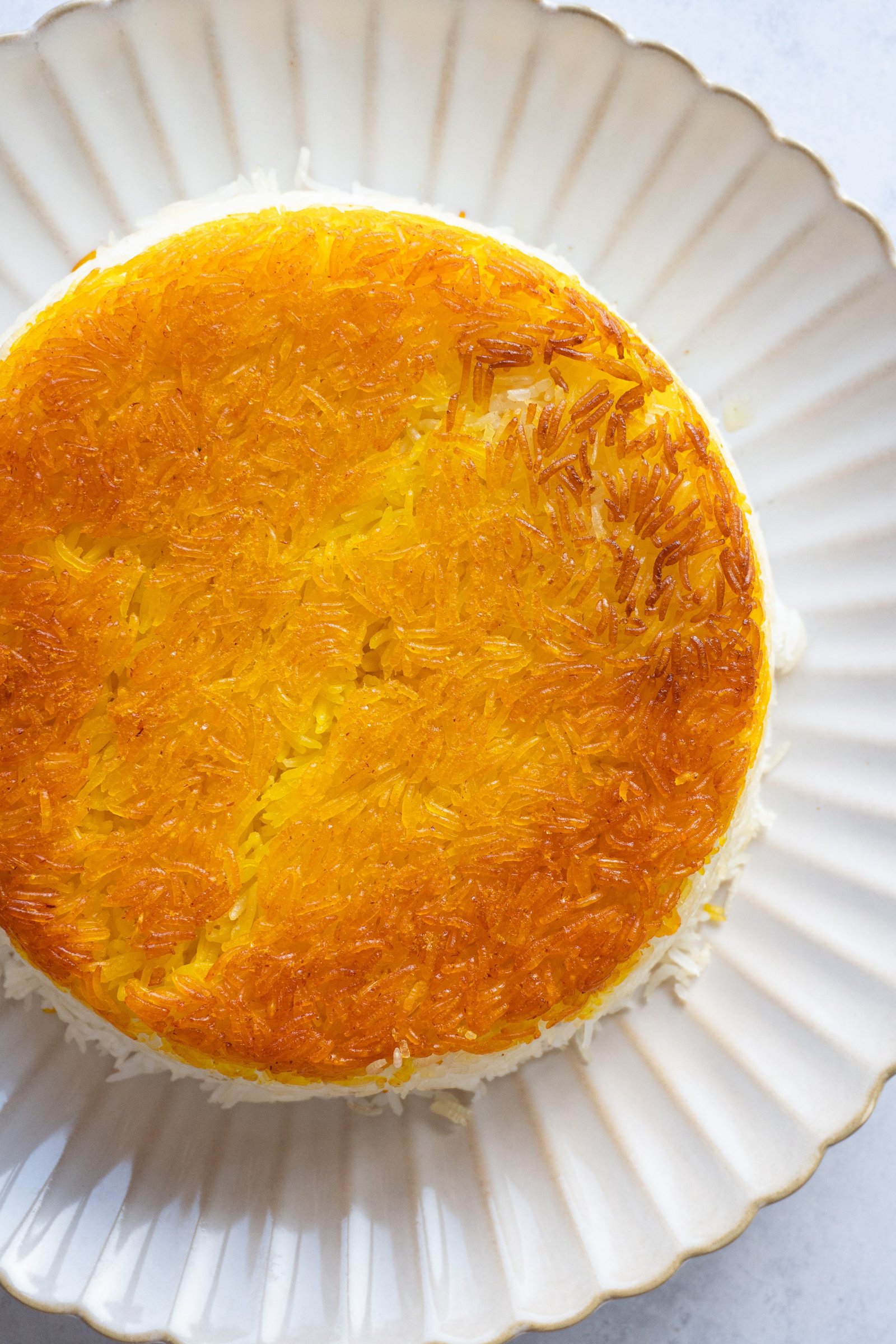
Types of Persian Rice
The key to creating the perfect Crispy Persian Rice is by using the right type of rice, such as basmati rice, and the right cooking techniques. Some traditional techniques to make Tahdig, include adding a small amount of oil or butter to the bottom of the pan, or creating a barrier between the bottom of the pan and the rice by using a piece of naan bread or potato slices (tahdig potato). The Tahdig is then cooked over low heat for 10-15 minutes, or until the bottom layer of rice is crispy and golden brown.
There are several variations of Persian rice dishes, each with its own unique cooking method and ingredients:
- Chelow Rice: The most common and traditional type of Persian rice dish, it is steamed and served with various stews and dishes.
- Tahchin: A baked rice dish made with saffron, yogurt, and chicken or meat.
- Baghali Polo: Rice mixed with dill and fava beans.
- Zereshk Polo: Rice mixed with barberries, served with chicken or meat.
- Albaloo Polo: Rice mixed with sour cherries, served with chicken or meat.
- Sabzi Polo: Rice mixed with fresh herbs, such as parsley, dill, and cilantro.
- Shirin Polo: Sweet and fragrant rice mixed with candied orange peel, cinnamon, and nuts.
- Havij Polo – Sweet and savoury Jewelled Carrot Saffron Persian Rice
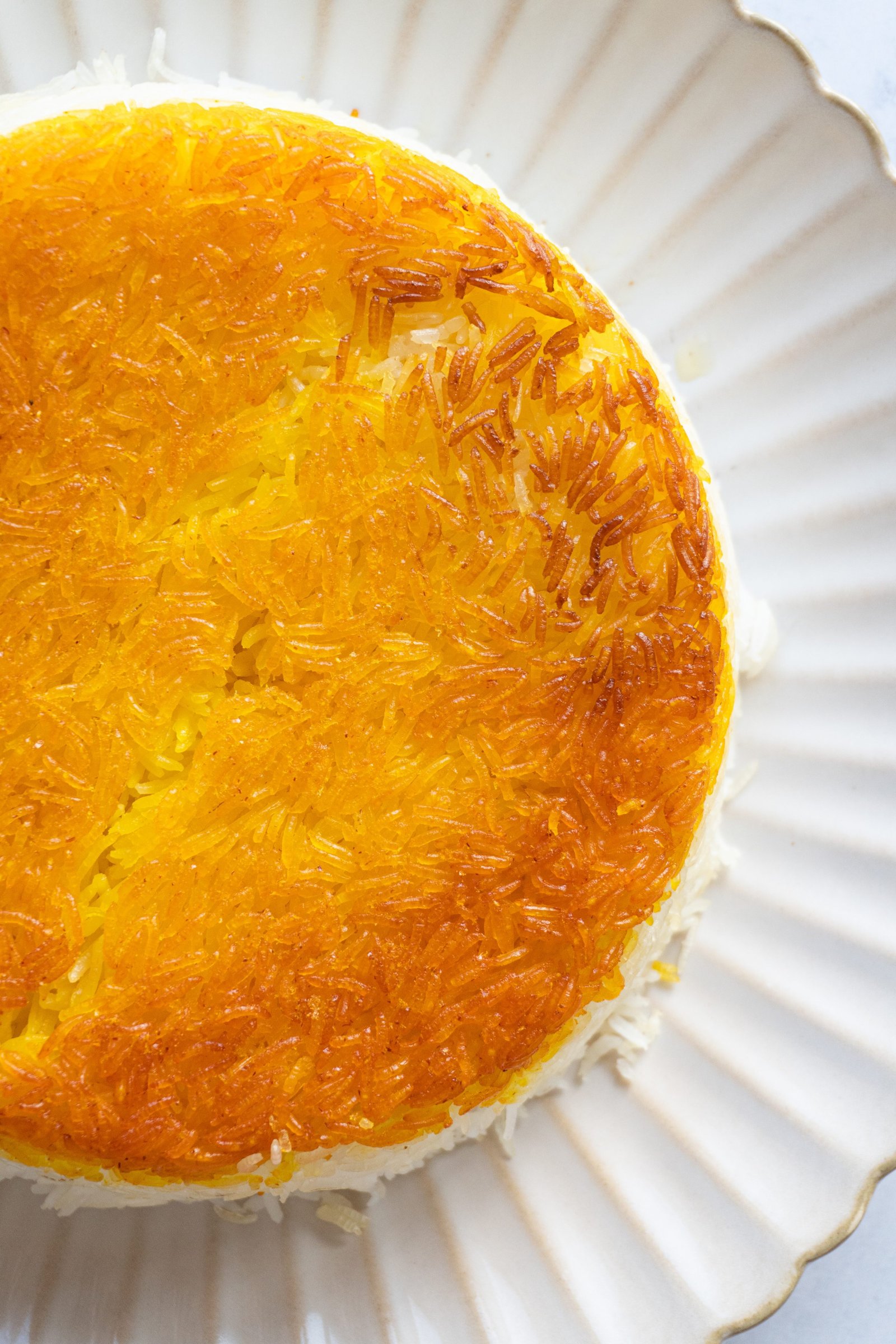
Ingredients
- Basmati rice
- Salt
- Ground Saffron or threads
- Ghee or Vegetable Oil
- Butter
- Water
Step by Step
Cooking the ultimate Persian rice, also known as Tahdig, requires the right ingredients and techniques. Here are the steps to make a delicious and crispy Tahdig:
- Rinse the rice in lukewarm water for 3-4 times, and soak for 30 minutes. This helps to remove any excess starch and ensures the rice cooks evenly.
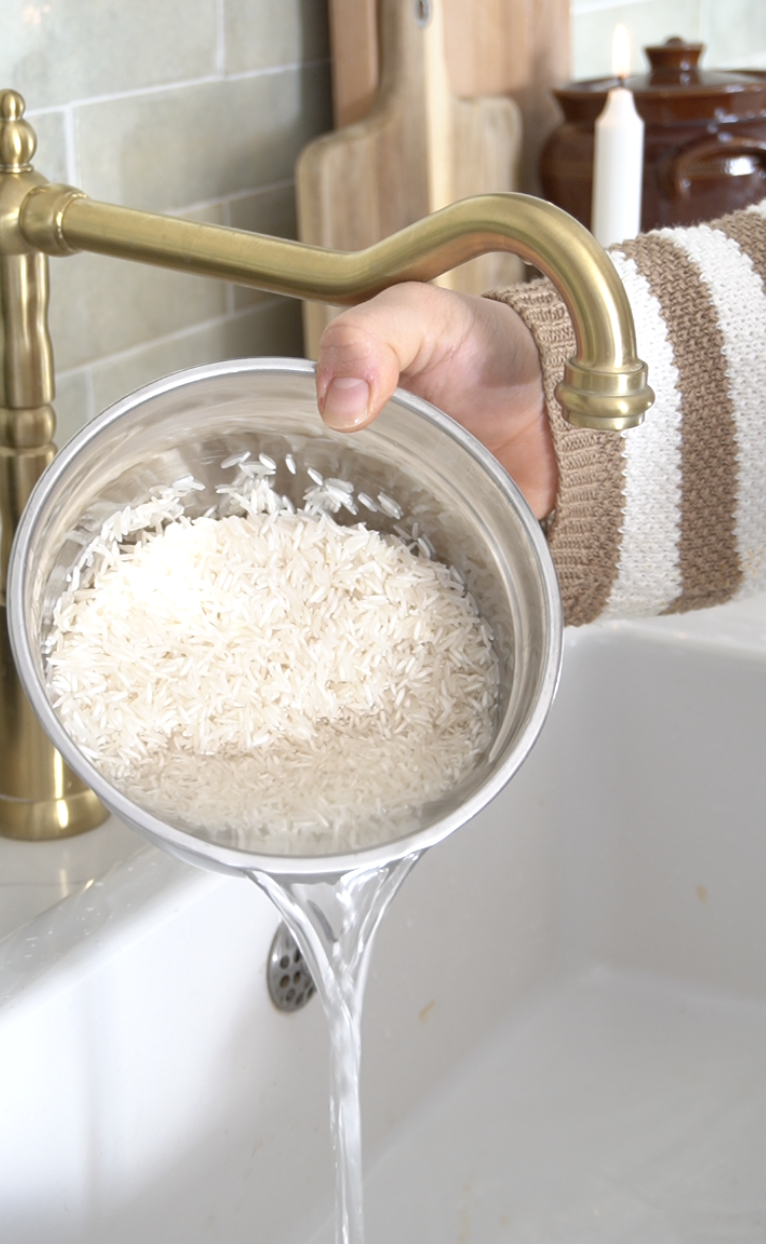
- Fill half of a non stick pot that the rice will cook in, with water and allow to come to a boil.
- Salt the water generously, add the juice of half a lemon (keep the rice super white).
- Add the rinsed and drained rice to the pot and allow to boil on medium heat for 10 minutes, the rice should no longer have a bite to it and it should have stretched in length.
- Drain the rice fully in a sieve and rinse with cold water.
- Heat up the same nonstick pot so that there is no water in the pot, add oil of choice and butter, along with 2 tablespoons of brewed saffron to the base of the pot.
- Pour the drained rice into the pot, flatten the top, drizzle more saffron and create some holes in the pot using the back of a fork/spoon. This helps for steam to build up in the pot and for the rice to cook thoroughly.
- Place a clean dish towel over the pan, cover it with a lid, and cook over medium-low heat for about 30 minutes or until the rice has fully cooked and become fluffy.
- Reduce the heat to low and continue to cook for another 10-15 minutes, until the bottom of the rice has become crispy and golden brown.
- To serve, gently flip the Tahdig onto a serving platter, so that the crispy side is facing up.
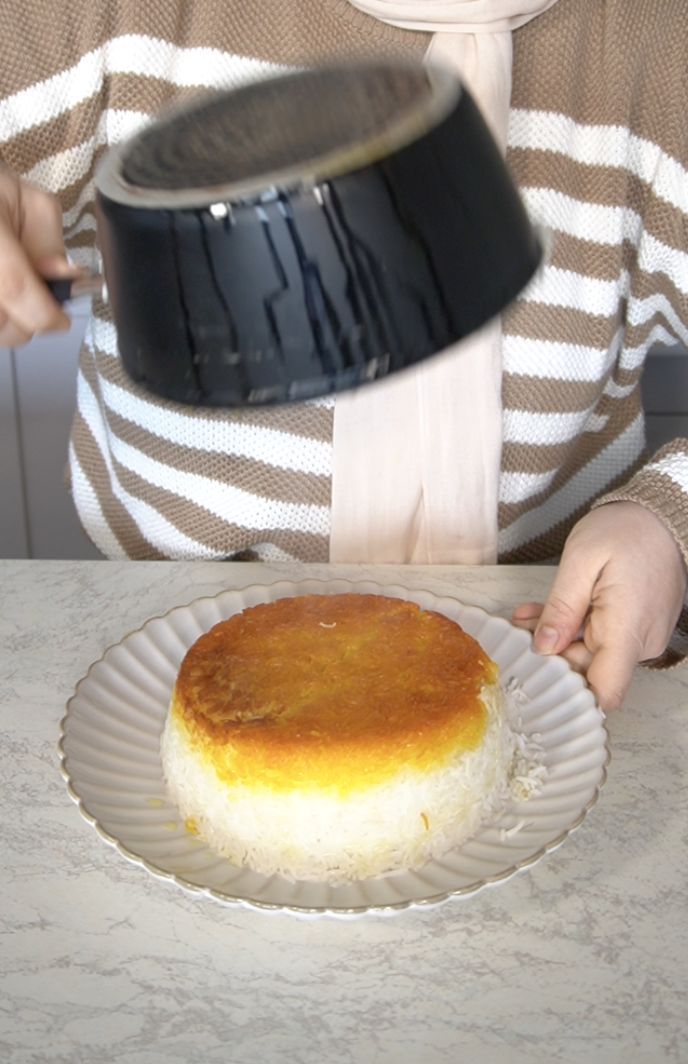
By following these steps, you can cook the ultimate crispy Persian Saffron Rice with Tahdig and enjoy a delicious and satisfying meal. Remember, practice makes perfect, so don’t be discouraged if your Tahdig doesn’t come out perfectly the first time. With a little patience and persistence, you’ll soon be able to make a delicious and crispy Tahdig every time. 🙂
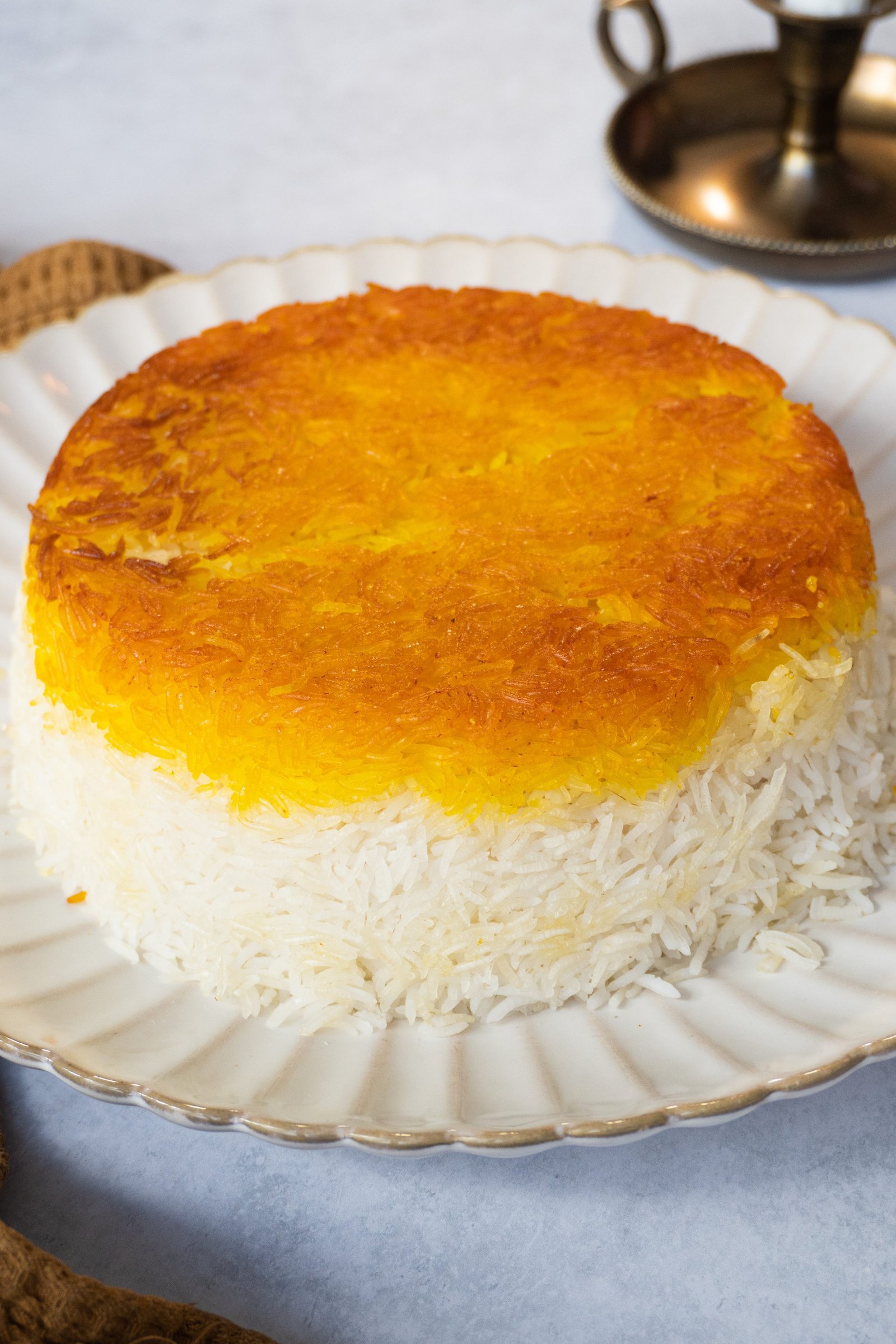
Frequently Asked Questions
1. Is it necessary to soak the rice before cooking Persian rice?
Soaking the rice before cooking helps to remove any excess starch and ensures the rice cooks evenly. It is not necessary, but it is a traditional step that is recommended for the best results.
2. How much saffron should be used in Persian rice?
The amount of saffron used in Persian rice varies depending on personal taste, but a good rule of thumb is to use about 1/4 teaspoon of saffron threads per cup of rice.
3. Can I make Persian rice without Tahdig?
Yes, you can make Persian rice without Tahdig, but it will not have the crispy texture that is characteristic of Persian rice. If you prefer, you can make a simpler version of Persian rice by simply cooking the rice with the other ingredients, without creating a separate layer of crispy rice at the bottom.
If you do make this recipe, please tag me on Pinterest or Instagram so I can see! It’s my favorite thing to scroll through stories and see what you are all making.
And of course feel free to leave any questions, comments, or reviews! This is the best place to reach me, and I’d love to hear from you 🙂
Recipes You Must Try
- Pistachio and Pomegranate Turkish Delight
- Tahchin – Persian Saffron Rice with Chicken
- 4 Ingredient Tahini Pistachio Date Bars
- Havij Polo – Persian Jewelled Carrot Rice with Saffron Chicken
- Persian Saffron Rice and Chicken with Dill and Pea
- Sweet Pepper and Dill Salmon with Buttery Dill Rice
- Mums Delicious Persian Pepper Chicken
- Kashke Bademjan – Persian Eggplant Dip
- Persian Rice Pudding With Rose Water and Cardamom
- Lubiya Polo – Persian Green Bean and Lamb Rice
- 30 Minute Creamy Turmeric Chicken Vegetables and Rice

Persian Saffron Rice With Tahdig
Ingredients
Instructions
-
Rinse the rice in lukewarm water for 3-4 times, and soak for 30 minutes.
-
Pour water in a non-stick pot that the rice will cook in, and allow to come to a boil.
-
Salt the water generously, add the juice of half a lemon.
-
Add the rinsed and drained rice to the pot and allow to boil on medium heat for 10 minutes, the rice should no longer have a bite to it and it should have stretched in length.
-
Drain the rice fully in a sieve and rinse with cold water.
-
Heat up the same nonstick pot and allow for every drop to evaporate then add oil and butter, along with 2 tablespoons of brewed saffron the pot.
-
Pour the drained rice into the pot, flatten the top, drizzle more saffron and create some holes in the pot using the back of a fork/spoon. This helps for steam to build up in the pot and for the rice to cook thoroughly.
-
Place a clean dish towel over the pan, cover it with a lid, and cook over medium-low heat for about 30 minutes or until the rice has fully cooked and become fluffy.
-
Reduce the heat to low and continue to cook for another 10-15 minutes, until the bottom of the rice has become crispy and golden brown.
-
To serve, gently flip the Tahdig onto a serving platter, so that the crispy side is facing up.


